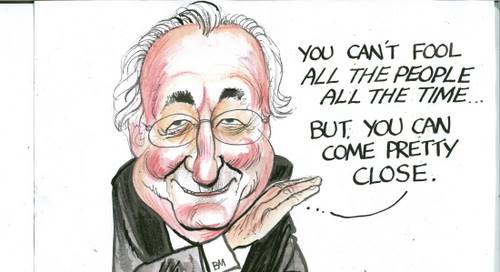Trust tinged by Greed will get abused. Bitcoin Tech Talk Issue #213
The past week in US politics has at times looked exciting, ridiculous, incredulous and inevitable. Over 120 million people in the US voted in a close and tightly contested election. What’s become clear since the vote is that there are not easily verifiable ways to know that the votes have been counted correctly, or that no one cheated. The attack surface of the voting is just so large that there’s no way to guarantee a free and fair election.
What’s more the choices that Americans are faced with are binary and there’s little room for subtlety in a vote. The result is that we get candidates that no one’s really satisfied with but nevertheless are passionately argued for. Why is this the case?
In the Bitcoin space, we’re used to being able to verify claims, and though there’s been plenty of scamming in our industry, there’s also been a lot of learning. Bitcoiners simply don’t fall for scams like they used to like in the 2011-2013 era. In fact, anything that even smells a little bit like a scam goes through a gauntlet of questions and accusations. Altcoiners call this “toxic maximalism,” Bitcoiners call this the community’s immune system. Bitcoiners have learned through the years what looks, sounds, smells too good to be true usually is. Inability to answer basic questions, for example, is a telltale sign.
Thus, scammers have gone onto much more fertile ground in altcoins and ICOs and DeFi. Cryptocurrency is an eternal September and there are always new people wanting to catch up in the gains that Bitcoin OGs have made. That greed leads to a willingness to trust some otherwise unsavory people. Even a small amount of research would reveal that nearly every “new and exciting” thing is a scam in one form or another, but that’s not what greedy people tend to engage in. That unearned trust, of course, is abused by the scammers for their profit.
In at least one sense, the same sort of thing is happening in US elections. The greed in this case is a desire to win and it’s likely being abused by those in power (politicians) for their profit. They can put unpalatable candidates that don’t fulfill what anyone wants as long as there’s some potential for voters to get what they want. The politicians have little reason to fulfill their promises and the voters get screwed, even (especially?) those that got the choice they wanted.
The solution is to not trust our politicians. They need to be held to a higher standard than “not the other guy.” But given a false dichotomy of choice, what are we to do? We can start by taking power away from the state and that starts with money. The government has enormous power because of its ability to deficit spend, which is really a fancy way of saying stealing from its citizens’ savings. If this power were in the hands of the people instead, how would that change politics?
We would have an immune system in politics the same way we have a community immune system in Bitcoin. Money is the cornerstone of government power and taking that back will start a process of reform. When I look at the political landscape, Bitcoin is something that gives me hope.
Bitcoin
Nicolas Dorier has an intriguing method of peer-to-peer loans using Discreet Log Contracts or DLCs. The innovation here is that the arbiter doesn’t know about the loan unless the two parties have some sort of conflict. Using Bitcoin as collateral and perhaps putting the hash of the terms into the OP_RETURN of the loan transaction, the arbiter would have proof of the terms of the loan. The idea itself is intriguing and I expect the Unchained Capitals of the world to provide this service eventually.
Blockstream has a blog post on their new Musig 2 protocol. MuSig is a way to do a Schnorr signature where keys and signatures are aggregated, making it indistinguishable from a single key Schnorr signature. The annoying part of the original MuSig protocol was that 3 rounds were needed to prevent certain types of attacks. MuSig 2 only requires 2 rounds and the first round can be prepared beforehand, making the process non-interactive. In short, we can have multisig Schnorr that behaves very much like the ECDSA multisig that we use now, instead of the complex back and forth the original MuSig scheme required.
Shift Crypto, creators of BitBox, has a post on the xpub gotchas in a hardware wallet setup. Essentially, most hardware wallets don’t verify xpubs in multisig setups very well. A 2-of-3 multisig, for example, needs not just verification of the key that’s on the hardware wallet, but the other two keys on the other wallets. This process is essentially showing the xpubs and having the user manually verify them, but it’s not something most hardware wallets do. This is an informative article and one hardware wallet vendors should pay attention to.
BitMex has a report on the prevalence of merge-mining on the Bitcoin blockchain. They’ve identified that on average, 2 other chains are being merge mined in every Bitcoin block. There are multiple ways to do this, with data in the coinbase transaction OP_RETURN as one option and data in the coinbase ScriptSig. RSK seems to be the most commonly merge-mined coin, though NameCoin has been merge-mined a lot longer. There’s even some merge-mined coins that BitMex couldn’t identify, which is interesting since clearly, there’s some benefit to the miner. Just goes to show how certain information doesn’t really become public, even when the evidence is out there in the blockchain. I suspect this might be a nice way for mining pools to get additional revenue that they don’t have to pay out to their pool members.
Lightning
Lightning Labs has announced a liquidity service on lightning called Lightning Pool. The reason this service is necessary is because getting inbound liquidity on Lightning is hard. For a node to open a channel, that node has to lock up Bitcoins, which can’t be spent any other way. In the traditional finance world, inbound liquidity is the equivalent of lines of credit, except that in the traditional world, the credit isn’t locked up to that borrower. Creating a market for inbound liquidity makes it a lot easier to become a well connected node, you just have to pay for it. I look forward to seeing how the market sets the prices on these channels.
Economics, Engineering, Etc.
0xB10C has written a report on BitMex’s daily withdrawal transactions creating high fees. The report is worth reading for the economic analysis. BitMex’s users spend about 1 BTC per day in fees and all of the withdrawals happen around 1300 UTC. The spike in transactions at that time around the world is obvious in any mempool explorer and fees spike right around then. The conclusion in the report is that BitMex could help the ecosystem by taking some concrete steps, like using SegWit.
Speaking of fees, Samson Mow describes the steps needed to prepare for the expected fees in the next bull run. The main things in the article are using SegWit and second layers like Lightning and Liquid to get around the expected high fees. My gut feeling on this is that exchanges haven’t felt the pain of high fees enough to really change yet. This next bull market may finally change this.
Greg Maxwell describes what happened after BSV eliminated p2sh. Having ripped out the main way to do multisig, they rolled their own crypto for multisig and much like ETH Parity’s vulnerability, anyone could spend these outputs with no signatures at all. Anyone that still believes BSV to be the found of productive use really needs their head examined. BSV continues to be an unmitigated disaster whose hope is entirely in a conman’s false claims to the throne. Along with the contentious BCH hard fork coming next week, the value of BTC forks is below 3% now.
Benjamin Powers lays out the issues that are around chainalysis firms. The main argument is that while blockchain forensics is currently used by western governments for supposedly good purposes, there’s a very quick and slippery slope to this power going to less honorable purposes. Governments can go from benevolent to authoritarian very quickly, so this is something to think about. Digital privacy will become a bigger deal, especially as Bitcoin increases past 6 figures, so developments on this front will be interesting to watch.
Another week, another DeFi disaster. This time, it’s something called Percent Finance, and they managed to permanently lock a bunch of the coins worth over $1M in their smart contract. Color me shocked. Obviously, they didn’t do enough of an audit on the code base that they copied from Compound Finance and got burned. DeFi has cooled considerably since the summer, and I really hope that those that got burned learned their lesson.
Podcasts
My podcast this week was with Tatiana Moroz. We talked about music, the state of the industry and what the life of a musician is like. She spoke about being a Bitcoiner in an industry that’s pretty left-leaning and how Bitcoin has helped her career.
I was on Tone’s election day podcast for about 11 hours. Lots of people came and went and there was a long discussion about blockchain voting.
You can take a break from COVID and election news with my books.
Fiat delenda est.









